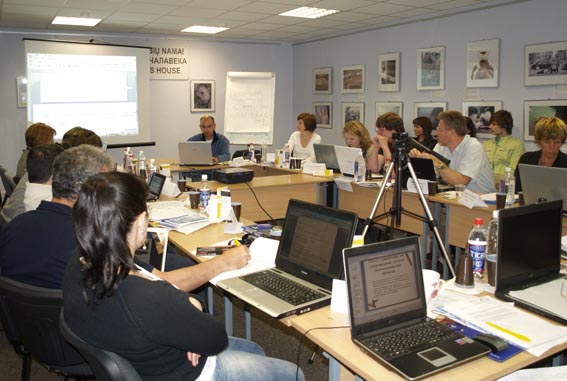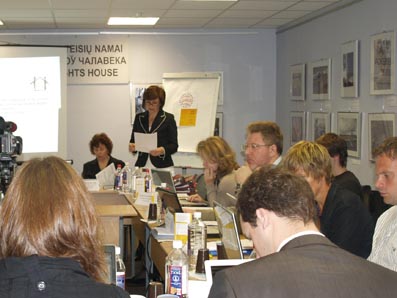
“Distance learning is very effective, for instance, for those who do not have the ability to leave their main working place or country to travel somewhere,” – says Liudmila Ulyashyna (left), the project manager from the Human Rights House Foundation.
According to her “the project offers a vast quantity of materials easily available on the internet, as well as experts who are willing to share their knowledge.”
Lawyers will be able to acquire valuable knowledge on how to apply international human rights standards into their everyday law practice. According to Ulyashyna, such an approach will give a possibility “to improve the protection of people; consequently this could lead to a change in law implementation and, even, legislation.”
Lawyers from Azerbaijan, Belarus, the Russian Federation, and Tajikistan will be able to enrol in this course. These four countries were selected for the participation by the project Steering Committee during a working meeting at Belarusian Human Rights House in Vilnius on 17 June.
Online distance training technology will be provided by the European Humanities University (former Belarusian independent university, now forced to function in exile in Vilnius, Lithuania). The Internet platform has been successfully used by the EHU since 2004 for teaching external and distance students.
Regional coordinators and national experts will help adopt the curriculum to the specifics of each country.
According to the regional coordinator in Belarus, Antanina Maslyka, in their country the main stress will be made on the freedoms of speech and association, as well as on the right to fair trial.
“We would like to create a joint venture of a professional approach to work and willingness to help ordinary people,” – says A.Maslyka, who is planning to attract to the project both professional lawyers and human rights defenders. “This would allow us to introduce human rights standards even to the lowest, district, courts. So that ordinary citizens could have the possibility to receive support, to which they have a right. Our state, unfortunately, is artificially limiting this right.”
Through defending the freedom of speech and promoting the human rights as a concept, Belarusian project coordinators are hoping to advance the understanding and importance of international law standards in everyday court practices. This would help to more effectively defend the rights of the whole society and not only the most politically active part of it.
Maslyka hopes lawyers in Belarus are interested in the project, as they understand the importance of international human rights standards implementation “not only for the society, but also for personal professional growth.”






